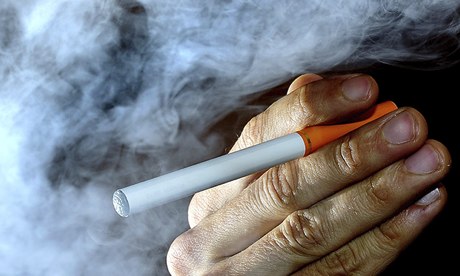
Arms outstretched against a blue sky, the casually dressed man in the advertisement leaps in the air, emulating the florid text that runs down the side of the page: "Self belief. You need it to climb Kilimanjaro. You also need it to be an epic dad who can endure three hours on the bouncy castle. E-Lites. Believe you can." Not sure what E-Lites are? The advert almost whispers that they are "the UK's favourite electronic cigarette".
We've become so used to the ban on tobacco advertising imposed in 2003 that to see smoking promoted again feels like a startling throwback. A Leicester reader says he was shocked to see the ad in the Observer last week. He was dismayed because it suggested to him the style of "the grand Marlboro cigarette adverts, aiming to associate self belief, fitness and good parenting with a nicotine rush". He was sad that advertisers had to dream up this approach but was "even more sad that my paper is carrying it", and, he asked: "Are we now likely to face a plethora of competing ads for other brands of electronic cigarettes, spewing out more specious copywriter's claptrap?"
A senior advertising executive told me that if other manufacturers were to approach the Observer and their adverts complied with ASA guidelines on legality, decency, honesty and truthfulness, they would be accepted. "My team always vets copy. Anything that is potentially offensive is rejected", he said, adding: "We constantly review the impact that advertising has on our business and our readers."
Currently, UK e-cigarettes sales are governed only by trading standards but there are moves to regulate them as medicines as there is some evidence that they help people stop smoking tobacco. Legislation differs around the globe, giving the impression that lawmakers are racing to catch up. Only last week, for instance, two days before he left office, New York mayor Michael Bloomberg expanded the city's tough anti-smoking laws to include e-cigarettes, banning them in offices, bars, restaurants and parks.
Devotees believe this is too heavy-handed, given that e-cigarettes emit vapour, not tobacco smoke. They work by heating and vaporising a nicotine solution, producing a "hit" without, say the manufacturers, the harmful tar and carbon monoxide associated with tobacco. About 1.3m people are using them in the UK and can, in theory, smoke or "vape" them anywhere.
"Evidence suggests that they help people stop smoking tobacco and they are less harmful than normal cigarettes so we want to regulate them like other medicines," a spokesman for the Medicines and Healthcare Products Regulatory Agency told me. The British Medical Association, however, is more cautious, saying there is no peer-reviewed evidence that they are a safe or effective way to stop smoking. It wants restrictions on their sale and promotion so that they are only targeted at smokers as a way of cutting down and quitting, and do not appeal to non-smokers, in particular children and young people.
Katherine Devlin, president of the industry trade association, admitted that there was uncertainty about what is allowed in e-cigarette advertising, but said her association is helping the Advertising Standards Authority formulate specific guidance by the middle of the year. .
Current ASA guidance tells advertisers to make clear whether the e-cigarette contains nicotine – something the E-Lites ad is careful to do, adding the enigmatic line "18+. Existing smokers only", which, they tell me, is intended to deter children and non-smokers – something that is surely difficult to achieve when there is currently no age restriction on the purchase of these products.
E-Lites and others in the industry believe the MHRA proposal is unworkable, and point out that the European Parliament rejected regulating e-cigarettes as medicines last October. The industry wants a regulatory framework and a minimum purchasing age.
This subject certainly won't be going away. Just before Christmas, during a debate in the Lords on regulation, Viscount Ridley made this telling observation: "There has been approximately an 8% reduction in the use of tobacco in Europe in the past year. The tobacco companies are worried. A big part of that reduction seems to be because of the rapid take-up of electronic cigarettes. They are facing their Kodak moment – the moment when their whole technology is replaced."

